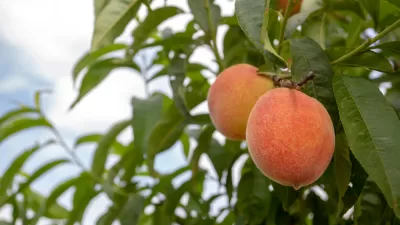An article by Colleen Fuller highlights collaborative initiatives in Maine's food system as well as key challenges the state faces in reaching a goal of increasing and broadening access to, and consumption of, local food.
Maine is investing more in local agriculture and is taking steps to return to a time when Maine was the "bread basket of the Northeast" and the majority of food consumed in Maine was produced in Maine. States interested in promoting local foods as part of larger planning efforts can learn from the successful collaborative approaches activating interest in Maine's food system.
Collaborative initiatives in Maine's food system include:
- Local Food Councils. Spearheaded by the Maine Network of Community Food Councils, local councils across the state apply a systems approach to supporting and strengthening food production and access. Efforts include the Maine Food Atlas, an asset mapping tool focused on food.
- Maine Food Strategy. This initiative is convening a statewide participatory process that will identify and advance shared goals to support a robust food economy in our state.
- Maine Local Foods Access Network (MLFAN), a group of Maine nonprofits collaborating to improve low-income access to locally grown foods across the state. Activities include Maine Harvest Bucks, where SNAP shoppers receive bonus local fruits and vegetables, stretching limited benefits much further.
- Maine's Farm and Fish to School. This network knits together a wide diversity of students, teachers, school nutritionists, parents, farmers and groups who support child nutrition and Maine agriculture.
- Maine Farm & Sea Cooperative, a procurement and food service management company that provides Maine institutions with the highest possible percentage of locally produced, value-added food.
Despite Maine's growing food revolution, there are challenges to promoting local food, such as the lack of processing facilities and poor infrastructure.
Planners can support local food initiatives by having strong, clear ordinances that prevent conflict between producers and their neighbors, such as local ordinances that strengthen state right-to-farm rules and allow farm stands and farmers' markets.
FULL STORY: Maine’s Road to a Food Revolution

Alabama: Trump Terminates Settlements for Black Communities Harmed By Raw Sewage
Trump deemed the landmark civil rights agreement “illegal DEI and environmental justice policy.”

Study: Maui’s Plan to Convert Vacation Rentals to Long-Term Housing Could Cause Nearly $1 Billion Economic Loss
The plan would reduce visitor accommodation by 25% resulting in 1,900 jobs lost.

Planetizen Federal Action Tracker
A weekly monitor of how Trump’s orders and actions are impacting planners and planning in America.

Waymo Gets Permission to Map SF’s Market Street
If allowed to operate on the traffic-restricted street, Waymo’s autonomous taxis would have a leg up over ride-hailing competitors — and counter the city’s efforts to grow bike and pedestrian on the thoroughfare.

Parklet Symposium Highlights the Success of Shared Spaces
Parklets got a boost during the Covid-19 pandemic, when the concept was translated to outdoor dining programs that offered restaurants a lifeline during the shutdown.

Federal Homelessness Agency Places Entire Staff on Leave
The U.S. Interagency Council on Homelessness is the only federal agency dedicated to preventing and ending homelessness.
Urban Design for Planners 1: Software Tools
This six-course series explores essential urban design concepts using open source software and equips planners with the tools they need to participate fully in the urban design process.
Planning for Universal Design
Learn the tools for implementing Universal Design in planning regulations.
Caltrans
Smith Gee Studio
Institute for Housing and Urban Development Studies (IHS)
City of Grandview
Harvard GSD Executive Education
Toledo-Lucas County Plan Commissions
Salt Lake City
NYU Wagner Graduate School of Public Service



























